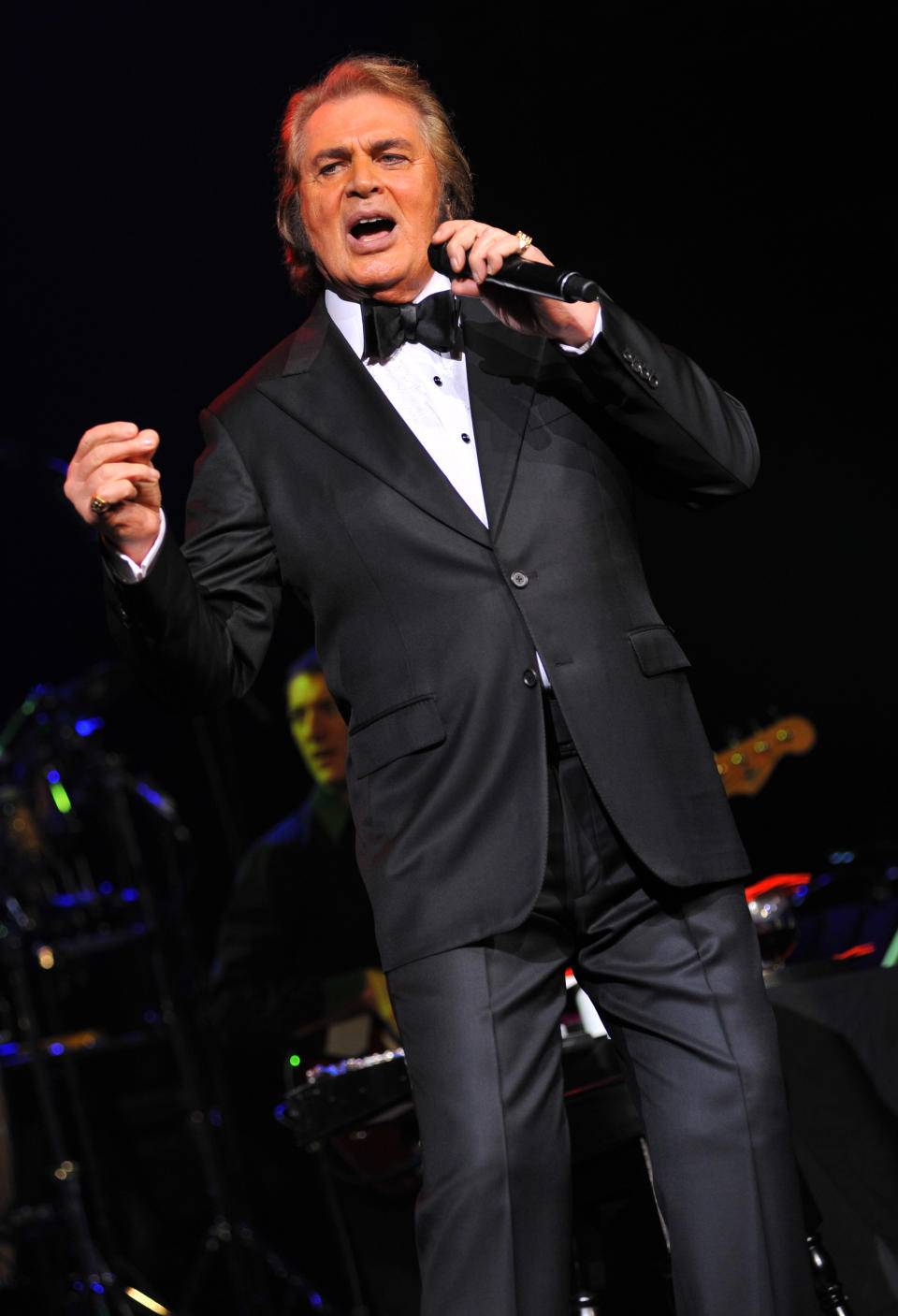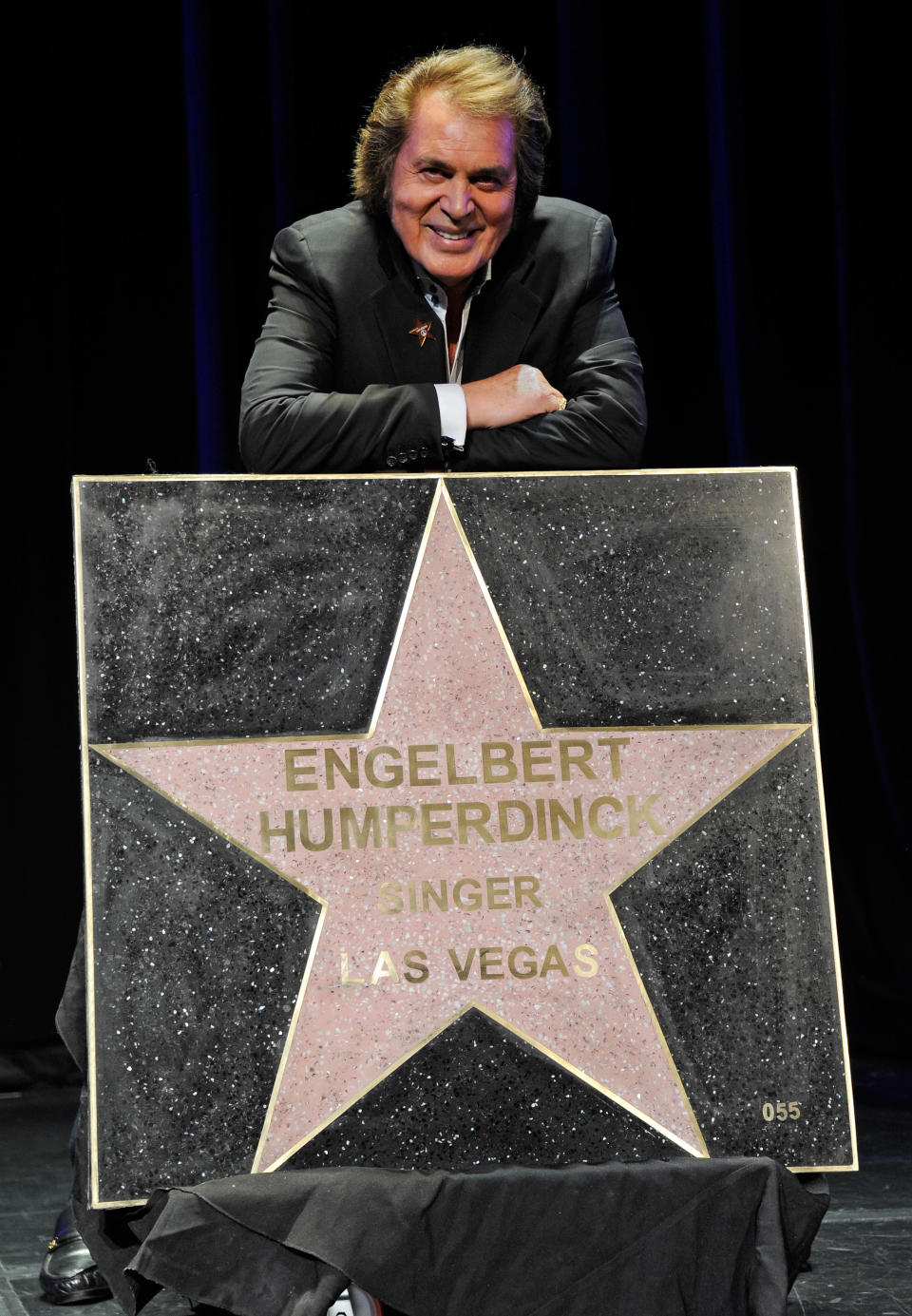Engelbert Humperdinck Teases New Music While Reflecting on Elvis, Dean Martin Friendships
It’s hardly a surprise that Engelbert Humperdinck describes himself as a romantic. After all, he’s been singing some of the world’s most beautiful love songs, including the hits “Release Me,” “A Man Without Love” and “After the Lovin,’” for six decades. “I have always approached my music with a romantic touch, singing these wonderful lyrics about love,” Engelbert, 87, tells Closer exclusively. “I think romance is what makes the world go round.”
The critically acclaimed performer released his most recent album, All About Love, last May. He is also the subject of a new documentary, Engelbert Humperdinck: The Legend Continues, and will be hitting the road this spring on his 2024 concert tour. “When people go to a concert, they want to hear the old songs they can relate to,” he says. “I’m grateful that the songs I recorded over 50 years ago are still as precious as when I recorded them.”
You were born to British citizens living in India. What do you remember from your childhood in Madras?
"It was just a magical country to be in. My father was in the service. We lived in a beautiful place, right near the harbor, in a massive house. It was such a colorful country. When you looked at the streets, they looked Technicolor because of the kind of garments that people wore. And the climate was perfect. You never had to worry about the cold. When the rains came, it was like a breath of fresh air. As a kid, it was all very exciting."

Where did your love of music come from?
"My family all loved to sing together. I can remember songs that I used to sing when I was like 5 or 6 years old. Later, I heard Jimmy Dorsey play. He was a saxophonist, and he played this song called 'So Rare,' which I fell in love with. I decided at 11 years old that I would like to start playing the saxophone. I wasn’t very good at it. I am glad that my instrument was in my throat because it was less scary and easier to handle. I was much more successful using my voice as my instrument."
Were your parents supportive of your dream?
"I can remember when I was a struggling artist my father said to my young lady, who was to be my wife, 'Why don’t you tell him to get a proper job?' And she said, 'He will do what he wants to do. He’s like you, very stubborn!' She stood up for me, she was so great."
But success didn’t happen quickly for you.
"No, I went to London, and I tried to break into show business. I had so many agents and many managers, and I really got disappointed. I learned that the first condition [for success] was a willingness to take rejection. And I took it many, many times! But it didn’t put me off. You’ve got to keep knocking on doors and struggling."
You were born Arnold Dorsey. How did you change your name?
"I first changed my name to Gerry Dorsey, and I tried for many years under that name. Then a guy called Gordon Mills, who eventually started to manage me, gave me the name Engelbert Humperdinck. It proved worthwhile to have a very different name."
The song “Release Me” became your first hit in 1967. How did it change your life?
"It was just an amazing transformation, from nothing to something. I was able to pay off my debts, and the taxman stopped knocking on my door! It was just unbelievable what that one record did for me. That song traveled all around the world. That doesn’t happen today. My career was so brand-new, and once I got one hit — I got three in one year! It was just huge. I was doing 300 performances a year."
You also became the star of your own variety series in 1969. What was that like?
"It was a learning experience. Guests like Tony Bennett and Jerry Lewis came over to do my show. Each time I’ve worked with somebody, I learned something different from them. If you’re going to steal, you have to steal from the best."
You also became friends with Elvis Presley. What was he like?
"One of the most gracious people I’ve ever met in my life. You know when you first meet somebody, they usually shake hands? Well, this guy didn’t. He embraced me. We got on well together. He would come see my show, and I would go see his show in Vegas."

How about Dean Martin? You were on his show.
"He was such a character. He never ever called me 'Engelbert.' He always called me 'Humpty Bumpy Lumpty Dumpty.' He was the most incredible person I’ve ever met in my life. A wonderful, wonderful man."
Did you know Sammy Davis Jr.?
"Sammy was a wonderful man, too! I have a lovely story about him — I was playing golf with him in Lake Tahoe. He was hitting the ball all over the place. I said to Sammy, 'You’re my partner, keep your eye on the ball!' And he looked at me and said, 'Engelbert, I have no choice!' [Laughs] Of course, he only had one eye! I didn’t realize what I was saying."
Did your kids follow you into performing?
"My children have been a part of my professional life for a long time. I have three boys and a girl. Some of them have been onstage with me, singing a couple of songs. And now my daughter’s daughter, who is 14 years old, is a brilliant singer. I’m sure she’s going to be a star.
You lost your wife, Patricia, in 2021 after nearly 60 years together. That must have been very difficult.
"Without her, I don’t think I would have been where I am today. She was very, very supportive of me, and she put up with a lot. She raised the children because I was on the road all the time. She was the backbone to my life. When I lost her, I lost part of my life. There’s a song that I dedicate to her in my show. It’s a song I wrote 30 years ago, and now the lyrics are even more poignant. It touches me every time I sing it."
In addition to the tour, documentary and new album, you are planning new music. Can you tell us about it?
"Next year, I will step out of my comfort zone and do something a little bit different. It’s a rather unusual concept album. Hopefully, people will enjoy this new music. I am very excited about it."
